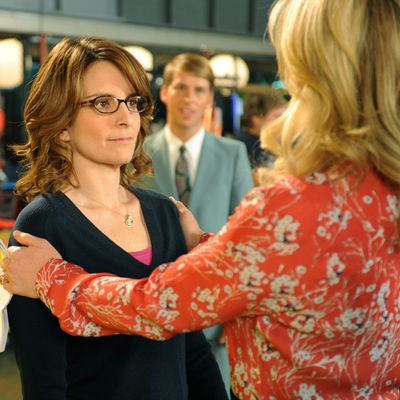
Sitcom finales don’t have to wrap everything up, though it’s nice if they do; they just have to remind you of the qualities that made you want to watch the show every week, and spark affection and reflection. 30 Rock’s two-part, interconnected finale did all of that, including the wrapping-up part, with the reflexive ease of Alec Baldwin’s Jack Donaghy slipping into his desk chair. It was one of the most satisfying sitcom enders I’ve seen, right up there with the end of The Mary Tyler Moore Show and Cheers, series that operated along the same no-fuss, let’s-all-have-a-good-time wavelength.
In my New York piece that ran before the finale, I speculated on how such a brazenly meta series could end. “30 Rock is uniquely skilled at eating its cake and having it, too, while crowing ‘Isn’t cake ridiculous?’ and making you crave cake,” I wrote. “A show this unpretentious yet assured can end however it wants and get away with it. Maybe the final scene will happen live while NBC stagehands dismantle the sets, pack up the props, and remove the actors’ wireless mikes. And we’ll cry anyway.” 30 Rock didn’t go the Blazing Saddles, cowboys-brawling-in-the-commissary route, though it did end with a wonderful shout-out to the snow globe conceit that ended St. Elsewhere, framing the show as a long family anecdote, told to the ageless Kenneth by Liz Lemon’s great-granddaughter in a Metropolis-looking future world complete with hovercars. Much of the finale stayed on the right side of “realism,” for whatever that’s worth (not much, probably).
The finale was filled with typically overt and playful acknowledgements that these characters were mere abstractions on paper, and that 30 Rock was just another TV show with actors clowning for the cameras. It was as if it were baiting us with the question, Why are you tearing up, viewers? The show answered the longstanding TV geek question of whether the actor Alec Baldwin exists in 30 Rock’s universe by having Jack include “Baldwin” on a list of prominent liberals infuriated by his wealth. (Though maybe he meant Daniel Baldwin, and in this world there are only three Baldwin brothers? You never know, people.) The finale also included one of 30 Rock’s finest fourth-wall-breaking asides: the moment when Jenna confessed that she’d never even met Mickey Rourke. Every couple of minutes there was a bit along those lines, like Jack baiting NBC’s real-world censors by snarling “hogcock” (the title of the finale’s first half).
Cumulatively, these gags had a reassuring effect. They told us that the show wasn’t suddenly going to start jumping in our laps and licking our faces like a puppy begging for attention — that, if anything, 30 Rock was going to push the other way,and ensure that any tears shed were borne more of respect than cheap sentiment. We all knew Jack wasn’t actually going to kill himself, but the final scene between him and Liz on the dock had me thinking that 30 Rock might go for the straightforward cry by having Liz’s longtime mentor/frenemy sail off into the darkness. But no: Once Jack had his great epiphany — GE could sell dishwashers with transparent doors so that you could watch the dishes being washed! — he turned the boat around and sailed right back, an anti-sentimental twist worthy of Cheers. In fact, there were other similarly themed moments that were very Cheers: Liz’s “honest” speech to Tracy in the strip club about how they’d never be friends after TGS ended; the Hitler-mustache commiseration between Tracy and Jenna. They made it feel as though Tina Fey and her writing staff were speaking directly to the viewers, warning them, “Yes, we know, it hurts to say good-bye, but trust us, you’ll get over this. It’s just a TV show, and we’re all just characters. We’re not really your friends.”
But they were — and nobody knew that better than 30 Rock. That’s why it ended by giving all the characters some version of what they subconsciously wanted or needed. As the A.V. Club’s Todd VanDerWerff wrote, 30 Rock ‘s final season has evoked the last season of The Mary Tyler Moore Show: “It’s deliberately constructing the ‘end’ of a sitcom story, a final season that closes a bunch of storylines fans didn’t even realize they were invested in.” 30 Rock did that while insisting it was way too hip and smart for that kind of thing; the show was hardnosed and softhearted, meta and sincere. It told us not to care by daring us not to care, knowing we’d care no matter what, because you can’t spend seven years in the company of people without caring about them at least a little bit. That’s TV. That’s life, too.
I already miss cake.


